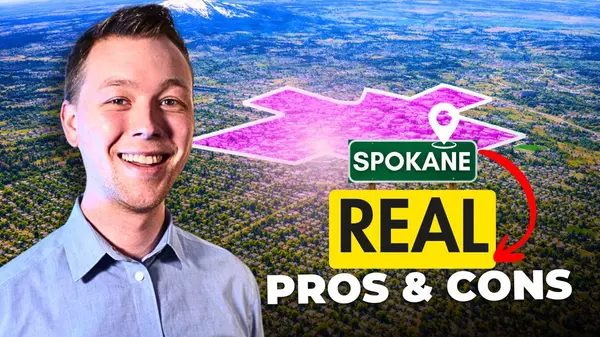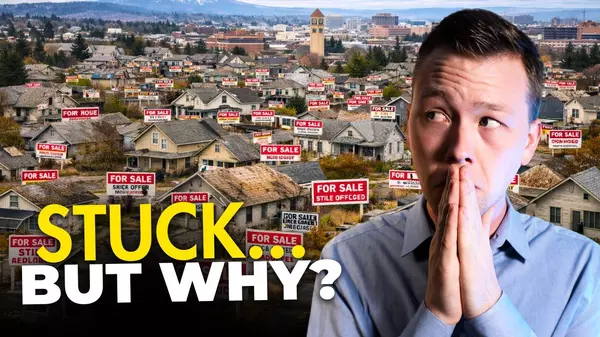The Spokane Bubble Burst of 2022

There have been a lot of murmurings online and in social circles that we may be heading towards another 2006-style housing market crash. This inventory problem started as the Great Recession began. During that time period, many contractors found themselves out of work, causing the development of homes to be on hiatus for several years. Then all of the sudden, demand caught up somewhere around 2016. While the number of houses available in Spokane is growing, it’s not nearly high enough to offset the steep prices buyers have grown too familiar with.

Rising interest rates have kept prospective home buyers at bay, slowing the sale of homes in recent months. Interest rates have doubled in the past year, now at 6.99 percent in the state of Washington which caused many to be hesitant when it comes to locking down a home.

Not only that, but the bidding wars that saw offers of tens of thousands of dollars over the asking price have dramatically dropped in frequency. From an average of 4.2 offers just 6 months ago, we're now only receiving just around 2.8. The sale of homes dropped nearly 30 percent compared to September of 2021 as well.
These factors have some thinking the Spokane market is going to see prices drop off dramatically. But all these aren't certain indicators of possible "bubble burst" or even something close to it. Historically, the housing market has not suffered from the frequent price bubbles and extreme volatility that are seen in other investments. Housing markets, however, occasionally experience moments of irrational exuberance that are followed by declines in both demand and prices.
What Causes Housing Prices to Fall?
Many factors, national and regional, have an effect on housing prices.
An increase in mortgage rates causes demand to cool or slow down. A big demographic trend, like baby boomers heading south to retire, has an impact as well.
Locally, there are even more factors to consider. Cities and neighborhoods become more or less attractive based on local economic conditions, tax changes, crime rates, and the quality of local services. This is why consulting a real estate professional is oftentimes necessary for you to effectively navigate the volatile market conditons.

What Causes a Housing Market Bubble?
The price of housing, like the price of any product or service in a free market, is driven by the law of supply and demand. When demand increases or supply decreases, prices go up. The supply of housing can be slow to react because it takes a long time to build or fix up a house. In some urban areas, there simply isn't any more land to build on.
So, if there is a sudden or prolonged increase in demand, prices are sure to rise.
Why Does a Housing Bubble Burst?
A bubble will finally bursts when the mood of the market changes, credit standards are tightened, demand decreases, supply increases, speculators leave the market, and prices start to fall. Which in our current case is far from happening given that there's still a shortage in supply of available homes
Will the Real Estate Bubble Burst in 2023?
There are as many answers to this question as there are economists.
The best guess may be based on the trends reported at the end of August 2022 by the S&P CoreLogic Case-Shiller Index, the leading measure of home prices in the U.S.
The index for June 2022 showed a continuing deceleration in price increases. Prices nationwide still increased at a hefty 18% annualized rate, compared to 19.9% in the previous month. Case-Shiller's analysis indicates that slowing price appreciation is likely to continue, particularly in the metropolitan areas where prices rose most rapidly during the pandemic.
Whether prices will actually fall is a tougher call. Fitch Ratings estimates that home prices are overvalued by an average of 11%. That argues for a price "correction," particularly in the regions where price appreciation has been steepest, starting with parts of the West Coast.
The Bottom Line
While housing markets are not often a subject to bubbles as some assets, housing bubbles do occur.
Long-term averages provide a good indication of where housing prices will eventually end up during periods of rapid appreciation followed by stagnant or falling prices. The same is true for periods of below-average price appreciation. Overall, a decision to buy or sell a home is far more complex than seeing numbers and stats. It's always about considering the long-term benefits homeownership can give.
We Can Help
Whether you’re a home seller or a home buyer looking to navigate these turbulent real estate market conditions, our team of expert real estate professionals can help. We are skilled at negotiating home prices and working with clients during volatile times. Let's Talk
Categories
- All Blogs (910)
- Airway Heights (5)
- Audubon/Downriver (4)
- Balboa/South Indian Trail (5)
- Bemiss (3)
- Browne's Addition (3)
- Buying Your Home in Spokane (207)
- Cheney (3)
- Chief Garry Park (3)
- Cliff-Cannon (3)
- Colbert (1)
- Comstock (4)
- Cost of Living in Spokane (1)
- Dishman (3)
- Downtown Spokane (1)
- Driving Tours (1)
- East Central (3)
- Emerson/Garfield (3)
- Five Mile Prairie (5)
- Grandview/Thorpe (3)
- Greenacres (3)
- Hillyard (3)
- Home Improvement (8)
- Home Prices (5)
- Housing Inventory (6)
- Housing Market (133)
- Housing Market Update (2)
- Instagram Videos (2)
- Interest Rates (24)
- Job Market in Spokane (3)
- Know Spokane (608)
- Latah Valley (5)
- Liberty Lake (8)
- Lincoln Heights (4)
- Living in Spokane (2)
- Logan (3)
- Manito-Cannon Hill (3)
- Medical Lake (4)
- Minnehaha (3)
- Moran Prairie (3)
- Mortgage (26)
- Moving out of Spokane (3)
- Moving to Spokane (143)
- Nevada/Lidgerwood (3)
- New Construction Homes in Spokane (1)
- New Construction Opportunities (3)
- North Hill (3)
- North Indian Trail (4)
- Northwest (3)
- Opportunity (3)
- Peaceful Valley (3)
- Riverside (3)
- Rockwood (4)
- Selling Your Spokane Home (163)
- Shiloh Hills (3)
- Southgate (3)
- Spokane Events (447)
- Spokane Neighborhoods (51)
- Spokane Restaurants/Food Places (24)
- Spokane Schools (12)
- Spokane Valley (14)
- Suncrest (1)
- Things to Do in Spokane (460)
- Veradale (3)
- West Central (3)
- West Hills (3)
- Whitman (3)
- Youtube Videos (49)
Recent Posts












